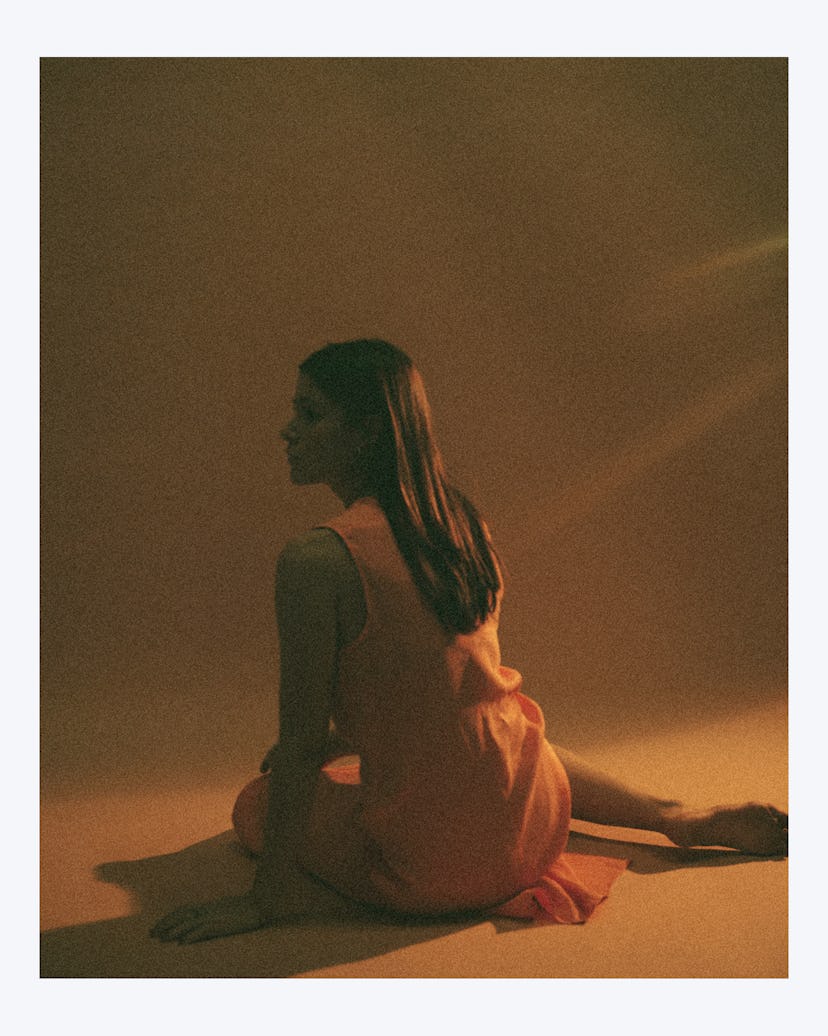On Circles, Swedish Musician Léon Puts Herself First

The Swedish singer-songwriter Lotta Lindgren, known by her stage name Léon, is intimately familiar with the legacy of American pop hits written by Swedes. Britney Spears’s “Baby One More Time” and “I Want It That Way” by The Backstreet Boys? Both were written by Max Martin, a Stockholm native. On a Zoom call from that very city, where she lives most of the year save a few months in and out of Los Angeles, Léon tells me the pop icons ABBA are some of her biggest idols, in addition to the Swedish pop-rock singer Gun-Marie Fredriksson, of the band Roxette. There isn’t any concrete, identifiable reason as to why so many pop hits are created in Sweden, a country with a population size just over that of New York City’s. But Léon, who first rose to musical prominence after her single “Tired of Talking,” went viral on SoundCloud in 2015, has one theory as to why such a small country could produce so many bonafide hits. “Those songs, they work so well because they’re so simple,” the artist tells me. “If you think about it, those lyrics don’t have any real fluff going on—they’re very straight to the message.”
With her latest album, Circles, Léon carries on that legacy of Swedes breaking into the American soundscape. And the pared-down, highly personal lyrics and melodies on the indie-pop record do echo the simplicity of the classic hits that she grew up listening to. But getting there—finishing Circles and releasing it on March 4—took Léon on an emotional rollercoaster. Things didn’t start out simply when Léon first began working on the album in early 2021. She’d just wrapped up and released her previous record, Apart, in October 2020; three months later, she sat down to write again. In the wake of the pandemic, Léon, like most other artists, was not able to tour newly released works—therefore, Apart didn't go through the same cycle as the musician’s previous albums. Going on tour, she explains, is a way to “let the songs live.” “I felt like I was doing the same thing straight after Apart,” she adds. “I was overthinking everything way too much. It made it harder to make this album in the beginning. I’d listen back to songs and think, ‘I’ve done that before, and I’ve done that before.’ It was just a killer, and not so fun.”
Meanwhile, Léon’s personal life began to mirror her work life when it came to emotional health. As the pandemic raged on, her anxiety levels spiked; a deep desire to go on tour caused a trigger for her anxiousness, too. She decided to return to therapy, where she hashed out “things that I hadn’t been digging through for a long, long time.” The process was arduous, but well worth it—the cloud of anxiety slowly began to lift.
As her mood lightened, the work on Circles became more intuitive. She decided to take it easy, grant herself breaks, and not put so much pressure on the work. When she approached her producers shyly with a new song she’d written for the album, she promised she’d listen to them once they told her it was good, quieting the voice in her head insinuating this was just the same music recycled from years before. “When we got into a groove, I just felt more relaxed, and everything unlocked,” Léon says.
One key aspect of untying the knots in her work had to do with spending time with friends. Isolation, Léon found, did her no good during times of high anxiety. Reconnecting with her best friends was one of “the best things about last year,” she says.
“I definitely prioritize being with my closest so much more than certain other things that I might have been into, or felt that I had to do with my time,” she adds. “And now I’ll cancel certain things, because I just wanna be hanging on a couch with my best friends and their babies. Nothing else is better than that.” Toward the tail-end of making Circles, Léon began working with one of her best friends, the Swedish musician Moa Michaeli, who goes by the moniker Maybe. “The tension of going into the studio and writing with someone new, I felt like I had to perform. I was beating myself up a lot in the beginning of the year: It has to be better!,” Léon recalls. “Moa came in with this light and just made it so fun. We’d be in our sweatpants, write, and talk, then watch a show, and then write a bit more."
Two songs that were born during those writing-from-home sessions happen to be two of Léon's favorites from the album: “Soaked,” and “Moonlight.” She brings these two tracks up multiple times during our conversation, saying they were special because they marked a departure from her usual manner of songwriting.
“I’ve written so many songs about love, and the relationship to someone else,” she says. “‘Soaked’ and ‘Moonlight’ opened up something new in the writing process: when I found a way to write about my own well-being. I tried to find a way to write songs that I comforted myself with when my anxiety was high."
Now, Léon is gearing up for her first tour since the pandemic, “Fade Into a Dream,” named after one of the singles from Circles. She’ll be traveling across Europe and North America, finally allowing the songs to go through their natural life cycle. (“I think my mood is getting better because I know that concerts are around the corner,” she says with a laugh.) Although the anxiety that stemmed from 2020 and early 2021 hasn’t entirely vanished, Léon’s overthinking has ceased, lending her a sense of calm she hasn’t felt in a long time.
“I had all these ideas that just came out of me,” she says, recalling that freeing sensation of creating Circles with no judgment toward herself. “That was just the best feeling.”